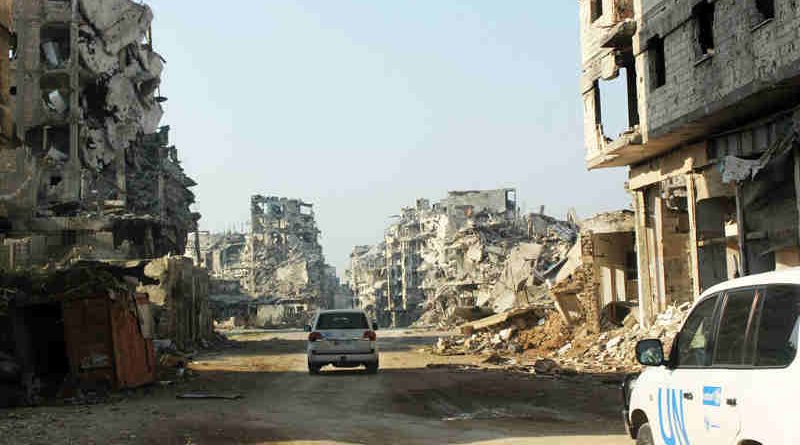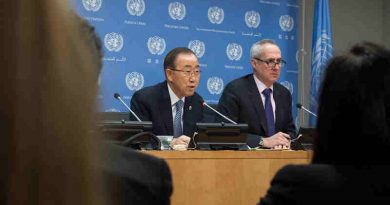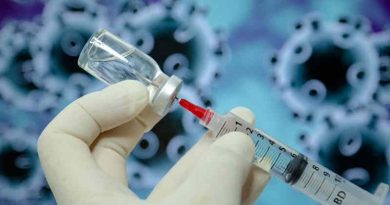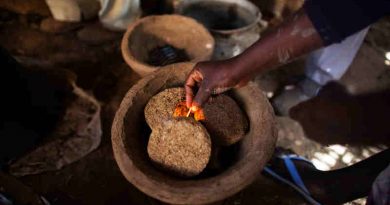WHO Demands Access to Site of Chemical Attack in Syria

The United Nations World Health Organization (WHO) on Wednesday said it has received reports that an estimated 500 patients at Syrian health facilities have exhibited signs and symptoms consistent with exposure to toxic chemicals, after the shelling of a Damascus suburb over the weekend.
Reports suggest that another deadly chemical attack was carried out in Syria on Saturday in the town of Douma. Chemical weapons are believed to have been employed by diverse parties to the conflict in Syria on at least 35 separate occasions since the beginning of 2013.
Weapons of mass destruction, such as those utilized in Syria, have a devastating impact on the right to life, and cause grotesque pain and suffering.
According to those reports, patients at health facilities displayed signs of severe irritation of mucous membranes, respiratory failure and disruption to central nervous systems.
[ Syria Crisis: Trump Says President Obama Saved “Animal” Assad ]
“We should all be outraged at these horrific reports and images from Douma,” Peter Salama, WHO Deputy Director-General for Emergency Preparedness and Response said.
Salama was referreing to reports from the agency’s health cluster partners – a WHO-led team of 118 national and international nongovernmental organizations, UN agencies, national authorities and donors working inside Syria to provide emergency and trauma care, as well as basic health services.
More than 70 people sheltering in basements have reportedly died, including 43 with symptoms consistent with exposure to highly toxic chemicals. Two health facilities were also reportedly affected by these attacks.
These detailed reports from WHO’s partners come as the UN Security Council tried and failed on Tuesday to adopt two competing resolutions that would have established a mechanism to investigate the use of chemical weapons in Syria, as well as another resolution concerning a fact-finding mission in the war-torn country.
[ Russia Rejects Allegations of Nerve-Agent Attack in Salisbury ]
Despite the deadlock in the Security Council, the Organization for the Prohibition of Chemical Weapons (OPCW) – the body which investigates allegations of such attacks – said Tuesday that it would shortly send a team to Syria to “establish the facts” surrounding the incident.
Secretary-General António Guterres has also expressed his outrage at reports that civilians in the enclave are being targeted by toxic agents, saying that any confirmed use of chemical weapons, by any party to the conflict, “is abhorrent and a clear violation of international law.”
[ Save the Lives of School Children in India ]
WHO meanwhile has demanded immediate unhindered access to the area to provide care to those affected, to assess the health impacts, and to deliver a comprehensive public health response.
The agency reminded the parties to the seven-year conflict of their obligation to refrain from attacking medical facilities and personnel, in line with Security Council resolution 2286, which was adopted unanimously in 2016 and which also demanded an end to impunity for those responsible for such attacks.
Staff from WHO assessed the extent of damages to some of the health facilities in areas in #EastGhouta where the fighting has ended recently. #Harasta National Hospital, with 108 beds, is structurally sound but has been completely vandalized.#Syria pic.twitter.com/emBkqbVnAd
— WHO Syria (@WHOSyria) April 11, 2018
Emphasizing that any use of chemical weapons for harmful purposes is illegal under international law, WHO stressed that global norms against chemical weapons reflect a particular abhorrence to their disproportionate harm to the old, the most infirm, and the very young.
WHO is currently coordinating the health cluster response for people displaced from Eastern Ghouta and stands ready to step up assistance to the newly accessible areas there once access is granted.
Since 2012 there have been sporadic reports of chemical events in Syria. WHO has no formal role in the forensic investigation of the use of chemical weapons. When an event is reported, WHO’s role is to conduct epidemiological investigations and implement public health emergency response measures, as necessary.






